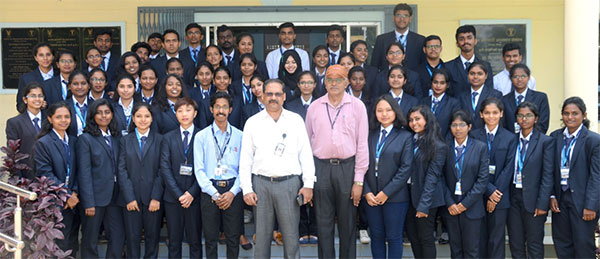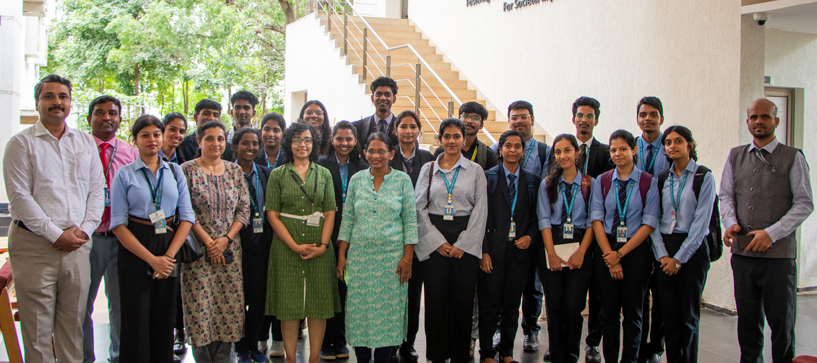
Industrial Visit
Visit to Indo American Hybrid Seeds (India) Pvt. Ltd.
Date: 23 September 2025
The Department of Life Sciences, Kristu Jayanti (Deemed to be University), Bengaluru, organized an enriching industrial visit to Indo American Hybrid Seeds (India) Pvt. Ltd., Bengaluru, exclusively for the III and V Semester Botany students. The visit was meticulously coordinated and accompanied by Dr. Indira, faculty member of the department, who guided the students throughout the program. The objective of the visit was to provide young learners with practical exposure to contemporary agricultural practices and to bridge the gap between theoretical knowledge and industrial applications.
During the visit, students were introduced to the processes involved in hybrid seed production, a critical area in modern agriculture that contributes significantly to crop yield, quality, and sustainability. Experts from the organization demonstrated how hybridization techniques are designed and implemented, emphasizing the crucial role of plant taxonomy in identifying and classifying parent lines. This scientific approach ensures that desirable traits such as disease resistance, higher productivity, and adaptability to environmental stress are successfully incorporated into new crop varieties. Students were able to witness firsthand how concepts learned in the classroom are practically applied in crop improvement programs.
Another major highlight of the visit was the exposure to plant tissue culture laboratories. Students gained insights into advanced techniques like micropropagation and germplasm conservation, which are indispensable in large-scale plant propagation. The demonstrations showcased how tissue culture not only supports the rapid multiplication of plants but also maintains genetic purity, eliminates diseases, and aids in the conservation of rare and endangered plant species. The interaction with technical experts allowed students to understand how biotechnology is shaping sustainable agricultural practices by ensuring consistent crop quality and availability. Beyond the technical knowledge, the visit also helped students appreciate the multidisciplinary nature of modern life sciences, where taxonomy, genetics, biotechnology, and agriculture converge to address global food security challenges. By observing professional work environments, students developed a deeper understanding of the importance of research, precision, and innovation in agriculture. The experience underscored the growing significance of biotechnological applications in meeting the demands of an ever-increasing population while safeguarding biodiversity.
Overall, the industrial visit to Indo American Hybrid Seeds (India) Pvt. Ltd. proved to be an educational and inspiring experience. It not only enriched students’ academic learning but also broadened their perspective on career opportunities in agriculture and biotechnology. Such initiatives by the Department of Life Sciences, Kristu Jayanti (Deemed to be University), reflects its commitment to providing holistic education that combines theory with practice, thereby nurturing future scientists and professionals who can contribute meaningfully to the advancement of applied botany and sustainable agriculture.
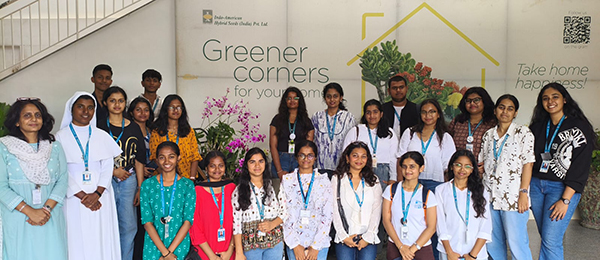
Industrial visit to Kodaikanal
Date: 28 February to 02 March 2025
Department of Life Sciences organized an industrial visit to Kodaikanal from 28/02/2025 to 02/03/2025 for VI semester B.Sc. students from BTBC, MBGE, BTBO and BTGE. It was experiential learning for the students as they visited Kodaikanal Solar Observatory, Indian Institute of Astrophysics and chocolate factory, Kodaikanal. The visit enhanced the practical prospective of the students by understanding the functioning of the research labs and great opportunities to interact with industry experts.
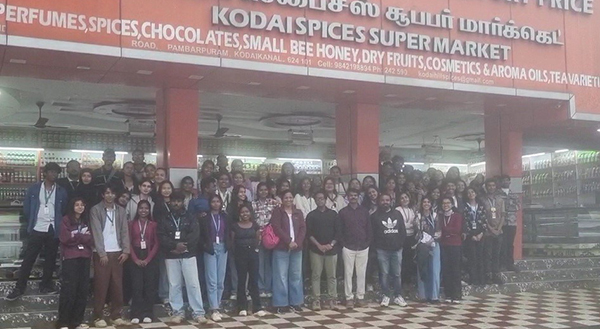
Shelcel Biozeen technologies Ltd.
Date: 21 February 2025
An Industrial Visit to Shelcel Biozeen Technologies Pvt. Ltd. for post graduate students of I year M.Sc Microbiology was organized on 21st February 2025 by the Department of Life Sciences, Kristu Jayanti College Autonomous, Bengaluru. The visit began with an introductory session by Ms. Nimi Mol, Trainee in charge. She briefed on Biozeen's mission to provide end-to-end biotechnological solutions for the pharmaceutical industry and its significance for its specialized services in cell culture, fermentation, and bioreactor systems that cater to the evolving needs of the biopharma sector. All the students led by Dr. Sangeetha Menon, Assistant Professor, Department of Life Sciences, were then taken on a tour of the company's manufacturing and R&D facilities. This section of the visit was particularly insightful, offering a comprehensive look into the biomanufacturing processes used to produce biologics, vaccines, and other therapeutic products. Students gained first-hand experience on the bioreactor systems used for cell culture and fermentation. They also visited the upstream processing unit, media preparation area, sterilization room and downstream processing unit. Students had the opportunity to interact with training in charges and technicians who explained the biotechnological processes, equipment operations, and quality control protocols in place to ensure product safety and effectiveness. The visit also gave students a better understanding of training, internship and career opportunities in the biotechnology and biopharma sectors, including roles in R & D, quality control, and process engineering. The industrial visit to Shelcel Biozeen Technologies Ltd was an invaluable learning experience. It provided students with practical knowledge of the biotechnological processes involved in the production of biopharmaceuticals, the real-world challenges of the industry.
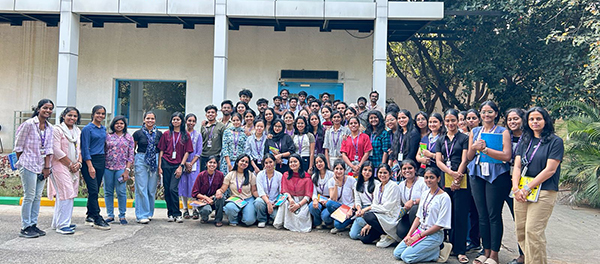
Industrial visit to Biozeen, Bangalore
Date: 17 February 2025
An industrial visit to BIOZEEN, Bangalore, was conducted, providing valuable insights into bioprocess equipment and biopharmaceutical manufacturing. BIOZEEN specializes in designing and building customized bioprocess equipment, including fermenters, bioreactors, CIP (Cleaning in Place), SIP (Sterilization in Place) systems, filtration systems, process vessels, crystallizers, and bioinactivation systems.
During the visit, the functioning of various equipment was explained by experienced professionals, highlighting their role in large-scale production. Special emphasis was given to CIP and SIP technologies, essential for maintaining sterility in biopharmaceutical processes. Additionally, information on BIOZEEN’s certification programs, covering microbial fermentation, mammalian cell culture, downstream processing, and sterilization and filtration technologies, was provided.
Overall, the visit was highly informative, and future collaborations with BIOZEEN are eagerly anticipated.
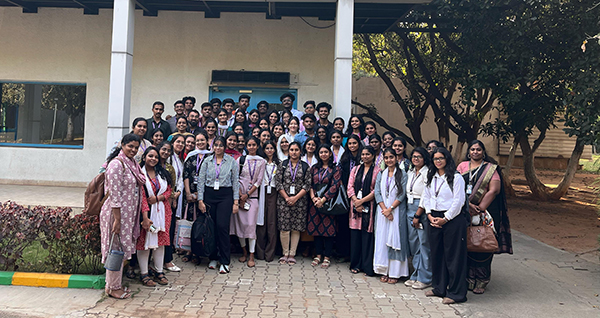
Industrial Visit to The Centre for DNA Fingerprinting and Diagnostics (CDFD)
Date: 21 & 22 October 2024
The Department of Life Sciences organized an industrial visit to The Centre for DNA Fingerprinting and Diagnostics (CDFD), located in Hyderabad, Telangana State, from 21st to 22nd October 2024. This visit was exclusively organized for the III Semester M.Sc. students specializing in Biotechnology, Biochemistry, and Microbiology, aiming to enhance their understanding of practical aspects in the field of molecular biology and diagnostics. The primary objectives of the visit were to provide students with hands-on exposure to various diagnostic techniques and laboratory operations. It offer insights into the functioning of an advanced research and diagnostics centre. Also it facilitate interaction between students and industry professionals, providing guidance on career opportunities in life sciences.
During the visit, students had the opportunity to explore multiple departments at CDFD, which included: Diagnostic Laboratory: The diagnostic section encompassed hematology, biochemistry, and microbiology units where students observed practical applications of molecular diagnostics. Research Labs: Students toured various research labs, witnessing firsthand how DNA fingerprinting, genetic diagnostics, and advanced bioinformatics play pivotal roles in current life sciences research.
The visit provided valuable experiential learning for the students.
• Enhanced understanding of the diagnostic processes involved in hematology, biochemistry, and microbiology.
• Exposure to high-end laboratory instrumentation and computing systems used in modern biological research.
• Interaction with industry experts, providing insights into ongoing research and career paths in life sciences and biotechnology.
The industrial visit to CDFD was an enriching experience for the students of M.Sc. Biotechnology, Biochemistry, and Microbiology. This opportunity allowed them to integrate theoretical knowledge with practical insights, bridging the gap between academic learning and industry practices. The visit underscored the importance of hands-on exposure to advanced research facilities in shaping their future careers in Life Sciences.
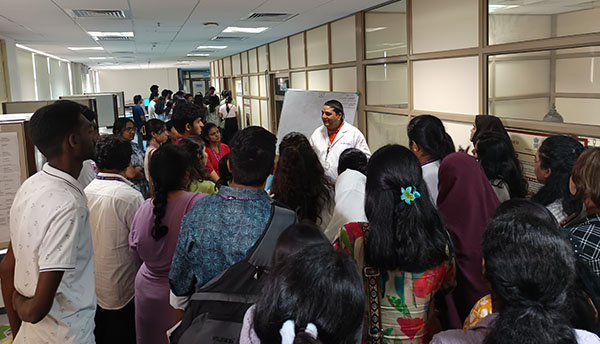
Industrial visit to Centre for Cellular and Molecular Platforms (CCAMP), Bengaluru
Date: 04 September 2024
The registered Students of BioNova & 19 were participated to visit the CCAMP at 04/09/2024. The students and the teachers had an incredible visit to the Centre for Cellular and Molecular Platforms (C-CAMP) and Molecular Platforms (CCAMP) with the students of the BioNova program. As a teacher, it is truly inspiring to witness the transformation in our students' perspectives on business and entrepreneurship, especially as they interacted with various incubatees. The hands-on experience and direct exposure to the thriving entrepreneurial ecosystem at Centre for Cellular and Molecular Platforms (C-CAMP) will undoubtedly serve as a major boost to the BioNova program. Seeing the students engage, ask insightful questions, and explore possibilities beyond traditional academics is a reminder of the limitless potential within each of them. A huge thanks to CCAMP and all the incubatees for providing such a stimulating environment and for sharing their knowledge and experience. This is just the beginning of an exciting journey for our aspiring biopreneurs! Looking forward to more such enriching experiences that will shape the future leaders in life sciences!

Industrial visit to Nueberg Anand Academy of Laboratory Medicine (NAALM)
Date: 29 August 2024
Department of Life Sciences organized an industrial visit to Nueberg Anand Academy of Laboratory Medicine (NAALM) on 29/08/2024 for V semester B.Sc. Biotechnology Biochemistry students. It was experiential learning for the students as they visited various departments such as the diagnostic laboratory's hematology, biochemistry, and microbiology. The visit enhanced the practical prospective of the students by understanding the functioning of the industry and great opportunities to interact with industry experts.
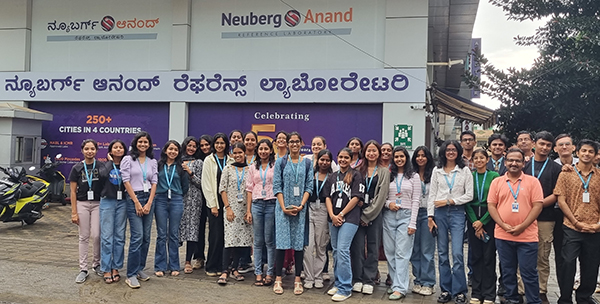
Lalbagh Botanical Garden, Bengaluru
Date: 13 August 2024
Botanical gardens are places of great academic and aesthetic interest and important places of research on flora. With the objective of exposing the students to the diverse flora and allowing them to explore the concept of taxonomy through experiential learning, the Department of Life Sciences organized a field visit for the III and V Semester Botany students to Lalbagh Botanical Garden, Bengaluru, on 13th August 2024. The Lalbagh Botanical Garden is one of the major attractions in Bengaluru due to its sprawling garden spread across 240 acres. The students guided by their faculty witnessed India’s largest collection of tropical plants and sub-tropical plants, including trees that are several centuries old in the garden. Lalbagh also houses plant species from all over the world. The floral arrangement in the glasshouse was mesmerising. The students made careful observation of the floral display and were curious to know the process of its cultivation and maintenance. They also saw the display of exotic fruits and flowers by the horticulture department of the Karnataka Government and other private companies. The visit was highly informative as it gave a strong impetus for the students to develop taxonomical interest and knowledge on the technique of conservation of rare and elite plant species.
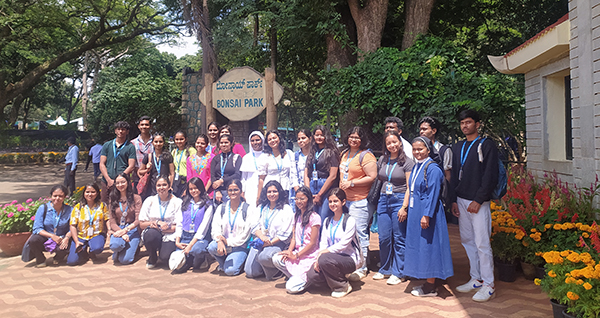
Knowledge Exchange Program
Date: 19 June 2024
The Department of Lifesciences organized a Knowledge Exchange Program to further their collaboration with The University of Trans-Disciplinary Health Sciences and Technology (TDU) on 19th June 2024. TDU is a thriving hub for transdisciplinary research, in Bengaluru that promotes exploration of multi-cultural and trans-disciplinary perspectives on nature and society.
The faculty of Life Sciences visited the multifaceted research centres. They visited the state of the art ‘FRLHT-TDU Herbarium and Raw drug Repository’ that houses the natural resources used in the Indian System of Medicine, in the form of herbarium and raw drug samples. They were briefed about the importance of herbaria, its techniques and crude drugs from plants. The staff also explained the digital herbaria maintained by them and the involvement of TDU in the preservation and conservation of rare and endangered plants.
They also visited the sophisticated Functional Genomics and Bio-Informatics Laboratory. The integration of Biology with Ayurveda was well understood with their visit to the Ayurveda Biology and Holistic Nutrition laboratory. They were taken to the scientific kitchen where they were exposed to instruments customized for food processing. The faculty also visited the Institute of Ayurveda & Integrative Medicine which offers patients safe, effective and affordable treatments. IAM focuses on the applications of traditional health sciences judiciously integrated with modern sciences. They also visited the herbal and medicinal garden in the campus which housed a plethora of rare and indigenous plants.
The staff of TDU cordially assisted the faculty in providing knowledge on the various research activities that TDU is involved in and were glad to collaborate with our faculty and assist students for their internship training. The knowledge Exchange Program was very enriching thus offering opportunities for faculty to broaden their horizon for imparting holistic and transdisciplinary approach towards their research interest and academic pursuit.
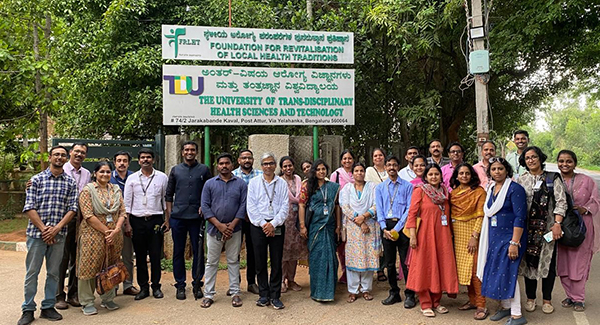
Industrial Visit to CSIR - Central Food Technological Research Institute (CFTRI) & DRDO- Defence Food Research Laboratory (DFRL), Mysuru,
Date: 15 March 2024
The Department of Life Sciences organized an industrial visit for second-year M.Sc. students specializing in Biochemistry and Microbiology to CSIR - Central Food Technological Research Institute (CFTRI) and DRDO-Defence Food Research Laboratory (DFRL) in Mysuru. CFTRI, established in 1950 under the Council of Scientific and Industrial Research (CSIR), focuses on food science and technology. Dr. Parigiri Ramesh Kumar, Sr. Principal Scientist, briefed the students on the institute's activities, emphasizing food processing and value addition to address food shortages. The students toured an exhibition showcasing CFTRI's research, followed by a visit to the Department of Microbiology & Fermentation Technology, where Dr. Prakash Halami discussed current research on probiotics and cereals. At DFRL, the students learned about various aspects of food science and technology, including convenience foods, food preservation, and food safety. Dr. Patil highlighted products developed for military and space personnel, emphasizing the importance of scientific research and development. The visit provided insight into translational research in food technology and opportunities in the field. Interaction with scientists sparked interest in food processing, nutritional evaluation, and food packaging among the students.
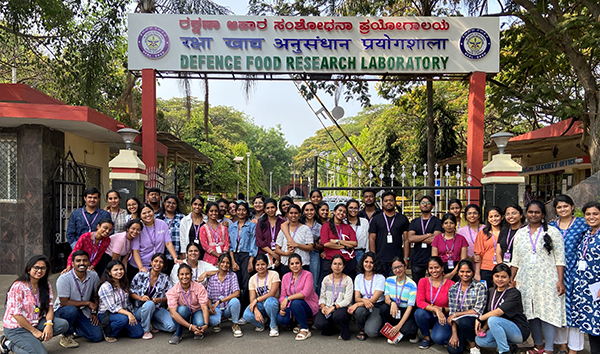
Industrial Visit to Sartorius Stedim Biotech India Pvt.Ltd, Nelamnagala
Date: 27 & 28 February 2024
Department of Life Sciences organized an Industrial visit to Sartorius Stedim Biotech, Nelamangala, Bengaluru for the Post Graduate students of II year M.Sc (Biotechnology, Biochemistry, and Microbiology). Sartorius Stedim Biotech is a leading partner in the biopharma industry. The key product categories of the company are cell cultivation, fermentation, filtration, purification, and fluid management. As a leading partner in the biopharmaceutical industry, Sartorius Stedim Biotech helps its customers develop their production processes and manufacture biotech medications and vaccines more efficiently. The visit commenced with an overview of Sartorius’s mission, vision, history, and services. During the overview, students were instructed about the safety measures that need to be followed in the industry. Staff from various departments such as; design, engineering, upstream processing, downstream processing, application store, and manufacturing gave students a brief insight about the departments and the workflow. A guided tour elucidated the several processes involved in the manufacturing of the fermenters right from the design, material selection, parts making, electro-polishing, quality control, quality assurance, assembling, and storage. Sartorius’s facility comprises mainly of two categories; Lab products & services and Bioprocess solutions. The application store exhibited the company’s products which range from cell-culture media, buffers, filters, chromatography units, bioreactors, fermenters both on small as well as large scales, and a virtual reality facility for hands-on training.
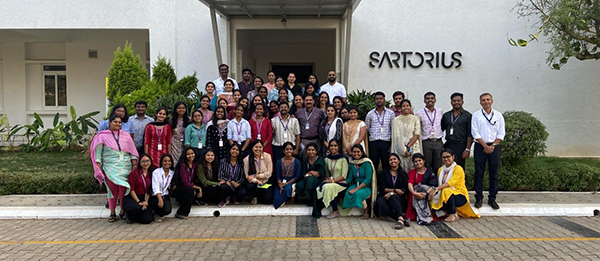
Field Visit Sinchana Sheep and Goat Farm Marenahalli, Bagaluru, Bengaluru North
Date: 09 November 2023
Animal breeding is the selective mating of animals to produce offspring with specific desirable traits or characteristics. The goal of animal breeding is to perpetuate or improve certain heritable traits in successive generations. The primary objective was to expose to. With the objective of exposing the III Year BSc (BTGE and MBGE) students to animal breeding techniques and strategies for improving livestock through experiential learning, the Department of Life Sciences organized a field visit to Sinchana Sheep and Goat Farm in Marenahalli, Bagaluru, Bengaluru on 9th Nov 2024.
The visit covered a range of topics viz., selecting breeding stock, breeding value, genetic variation, designing a cross, and maintenance of goat and sheep breeds. The students were exposed to wide different varieties of indigenous and exotic breeds viz, African Boer goat, Betel goat, Dorper sheep, White Dorper sheep, and Pure Merino sheep. Field visits like these emphasises the importance of practical experiences in enhancing students' understanding of animal breeding. Mr. Muzammil, the farm consultant, explained fundamental principles of animal breeding and benefits of livestock farming. The presence of Mr. Ashok D and Dr. Jagadisha TV, faculty members from the Department of Life Sciences, Kristu Jayanti College, provided guidance and supervision, ensuring that the students gained meaningful insights from the field visit.

Industry Visit to Bangalore Biozeen Labs PVT LTD
Date: 04 November 2023
The Biozeen industry visit provided enhanced knowledge on industry standards, quality control, and ethical considerations. Insights into career opportunities, challenges, and emerging trends deepened my appreciation for the biotechnology sector, inspiring future innovations. Biozeen, a manufacturer of custom biopharmaceutical equipment, conducts diverse training programs benefiting industry newcomers, ranging from day workshops to 4-6 months’ duration. The visit commenced with an overview of Biozeen’s mission, vision, and services, shedding light on the biotechnology industry's value chain. A guided tour elucidated the pilot-level machinery used for training, showcasing filters, fermenters, and equipment for upstream and downstream processing. Biozeen's facilities, including a fermenter, ACC lab, and sterilization unit, offered a tangible insight into industrial technology. In conclusion, the visit to Biozeen PVT LTD proved transformative, providing a first-hand look into the dynamic world of biotechnological innovation. Witnessing the synergy between research, technology, and real-world applications was both inspiring and educational. Interacting with industry experts and understanding their dedication to advancing scientific frontiers left a lasting impression. This experience not only broadened my understanding of biotechnology but also sparked a newfound curiosity, motivating further exploration of the profound possibilities this field holds for the future.
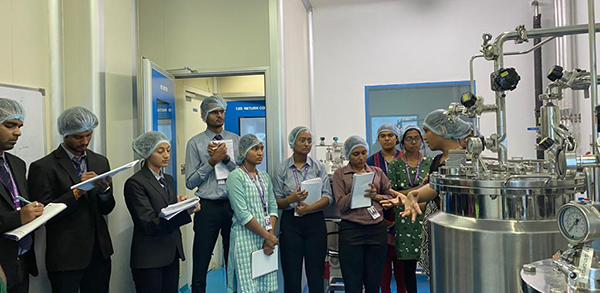
Field Visit to Herbarium and Raw Drug Repository The University of Trans-Disciplinary Health Sciences and Technology, Bengaluru
Date: 02 November 2023
Plant taxonomy provides the fundamental foundations of preservation, practise and sustainable management of the plant resources. With the objective of exposing the students to nature and allowing them to explore the concept through experiential learning, the Department of Life Sciences organized a field visit to Herbarium and Raw Drug Repository, The University of Trans-Disciplinary Health Sciences and Technology (TDU), Bengaluru, on 2nd Nov 2023. TDU is an ecosystem that promotes exploration of multi-cultural and trans-disciplinary perspectives on nature and society. This state of the art ‘FRLHT-TDU Herbarium and Raw drug Repository’ houses the natural resources used in the Indian System of Medicine, in the form of herbarium and raw drug samples. The students visited the herbarium section and were briefed about the importance of herbaria, its techniques and crude drugs from plants. The students made careful observation of the botanical drugs maintained in the museum. They also visited the herbal garden in the campus which housed a plethora of rare and indigenous plants. The staff of TDU gladly assisted the students and provided insights on taxonomy and economic botany. The visit to the medicinal garden gave them a peek into the native plants used in Ayurveda treatment. The students made few collection of wild plants for their practical submission. The field visit exposed students to indigenous plants and their economic utilization in traditional system of medicine. The students were able to understand the importance of taxonomic studies and significance of conservation.
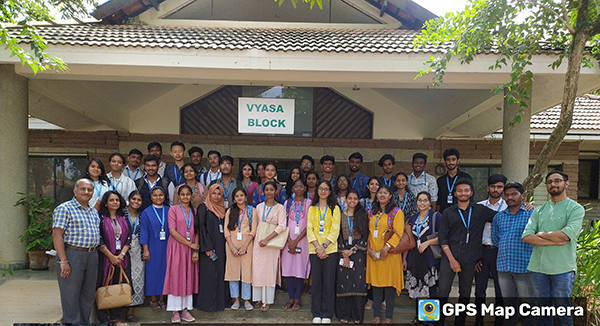
Educational Trip to Chikmagalur and Coorg
Date: 27 Sep to 01 Oct 2023
Department of Life Sciences organized an educational trip to Chikmagalur and Coorg from 27th September to 1th October 2023. Overall 83 students of final Year M. Sc. (Biotechnology, Microbiology, and Biochemistry) were accompanied by 4 teachers, Dr. Priya, Dr. Sonia, Dr. Challaraj and Dr.Vijayanand from the Life Science Department. The Journey started on the 27 September night from KJC Campus, reached Chikmagalur on the 28th morning, and were taken to Z point, the highest peak in Karnataka, followed by Baba budangiri, a temple and mosque at the same place. Post lunch they visited Mullayanagiri trek point for an amazing view and finally headed to Siri statue that symbolysis mother nature. On 29th September early morning they reached Coorg. In the evening they visited the Tibetian colony to visited the Namdroling Monastery Golden temple a place with full of culture and heritage. On 30th September they visited Raja seat, Madikere which is an exquisite view of the western ghats and then to Raja tomb which is a 19th century monument that is dedicated to the Kodava clan.
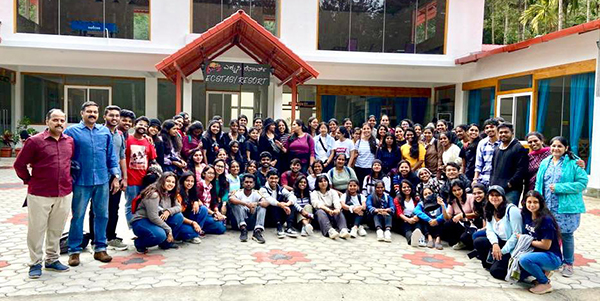
Educational Trip to Coorg
Date: 24 and 25 March, 2023
Department of Life Sciences organized an educational trip to Coorg on 24th and 25th March 2023. Overall 93 Students of final Year B. Sc. (BBG, MBG, and BBB) were accompanied by 3 teachers, Dr. Indira, Dr. Jyoti R., and Prof. Ashok from the Life Science Department.
The journey started on the 23 March night from KJC Campus, reached Kushalnagar on the 24th morning, and was taken to Mandal Pete at Madikeri for a sunrise view. They also trekked along and also enjoyed the jeep ride. Later they visited Cauvery Nisargadhama where they enjoyed sightseeing. Then they visited Dubare Elephant camp where they witnessed the bathing of Elephants and spend some time walking in the water. On 25th March they visited Rajaseat Madikere which had a display of flowers and the tomb of the king. Students visited Omkareshwara temple and on the way visited the Tibetan monastery and reached Bangalore the same night.
Students enjoyed the trip. They could see vegetational diversity.
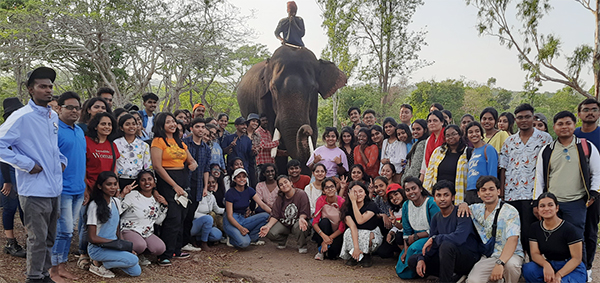
Indian Institute of Horticultural Research, Hessaraghatta Lake Post, Bengaluru-560 089
Date: 22 February, 2023
Under the theme of “Innovative Horticulture for Self-Reliance,” the Indian Institute of Horticultural Research organized the National Horticultural Fair-2023 from 22nd February to 25th February 2023 at its Campus at Hessaraghatta, Bengaluru. The Final Year BSc Botany students along with their faculty Dr. Indira made a visit to the Horticultural Fair on 22nd February 2023. An array of hybrid and high-yielding crop plants, ornamentals, and fruit plants were displayed in the field. The fair was open to farmers, agriculturists, academicians, and students across India. Students were given the opportunity to interact with the plant breeders, agricultural technologists, and vendors who briefed them about the various varieties of plants released by their organization and the latest tools and implements used for the commercial improvement of crops. They were also oriented on advanced research areas like hi-tech horticulture, soilless farming, crop protection flower and medicinal crop varieties for import substitution, pollination in protected cultivation, carotenoid content rich marigold varieties, flower waste utilization, terrace gardening solutions for urban horticulture, production technologies for exotic fruits such as dragon fruit and avocado and cost-effective traps for management of invasive pests, etc. The field visit was highly educative Also, the students will be now able to understand the application of research and technology in agriculture and crop breeding.
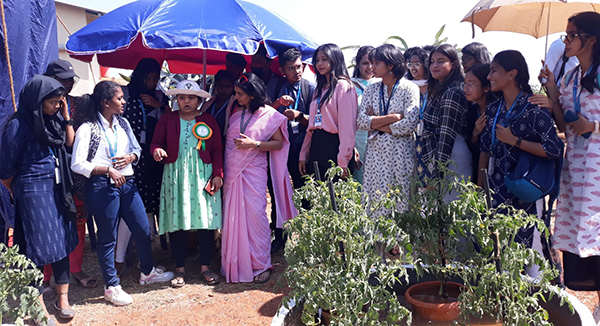
Field Visit to Water Treatment Plant, TK Halli
Date: 14 February, 2023
Bangalore Water Supply and Sewerage Board (BWSSB) currently supplies approximately 900 million liters (238 million gallons) of water to the city per day, despite a municipal demand of 1.3 billion liters. Water for the city (with a population of 10 million) comes from a number of sources, with 80% of it coming from the Cauvery River. This Kaveri River project is the major water scheme for Bangalore and is imported by the BWSSB from the Cauvery River, over 100 kilometers (62 mi) south of the city. Cauvery water was originally drawn from a reservoir near the village of Thorekadanahalli. To meet the increasing demand, the "Cauvery Water Supply Scheme" was undertaken by the BWSSB, with Stages I - III completed. Stage IV is currently being built, with Phase, I completed and bringing an additional 270 million liters to the city. Construction of Stage IV: Phase II is expected to bring an additional 510 million liters, and will be completed by 2010.
Engineer In Charge of the Visit Er. Diwakar explained to students, that the plant is Asia’s biggest water purification plant with 5 stages of purification and pumping along with conventional and latest technology as its unique and exclusive just 52 employees to handle the entire plant. During the visit, students learned about the identification of the level of impurities in water, the formation of the layout of the plant, identifying the level of Chlorine in the plant, and the technology adopted (Pulsification and DAF) for better water treatment. The visit provided an opportunity for students to get exposure to industry situations and practical experience which facilitated them to enhance their skills and industry understanding. The engineer briefed about the chlorine tank, leakage, monitoring, and control initially while entering the purification plant.
The process was briefed to the students starting from the cascade aerators which is used to sediment the coarse particles and waste materials from water derived from the reservoir bed by gravity separation. He also explained the next step of treatment, i.e. chlorination and alum dosing to filtered water samples also explained the use of a flash mixture of water and sludge formation. He took students through the DAF (Dissolved Air Floatation) units and how clarified water is separated by atmospheric pressure. He gave an insight into the coagulation mechanism and flocculation techniques involved in the further processing of drinking water. The process of using sand filters called Azura filters procured from Rajasthan and Gujarat was demonstrated to students how the final filtration was done to ensure the water was suitable for Human consumption. Finally, they showed the filtration and backwashing and how water leftover after treatment is recycled to get through the serial processing techniques.
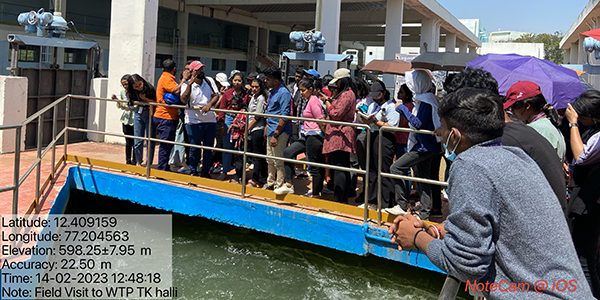
Industrial visit to Sula Vineyards, Channapatna, Karnataka
Date: 13 February, 2023
In order to align academic knowledge with industrial realities, the Life Sciences Department of Kristu Jayanti College conducts an annual field visit for their final-year students. This year, the visit was scheduled for Monday, February 13, 2023, and took place at Domaine Sula, the winery of “Sula Vineyards” in Karnataka. The visiting group was mainly composed of IV semester students from the Master of Science programs in Microbiology, Biotechnology, and Biochemistry, accompanied by two members of the faculty, Dr. Challaraj Emmanuel and Dr. Sonia Angeline.
Domaine Sula is located in the immediate vicinity of Bangalore (Karnataka), on the Bangalore - Mysore highway. With the state of Karnataka being the second-largest grape-producing region with emerging wine culture, the vineyard Domaine Sula encapsulates all things wine beautifully and depicts the rich heritage of Indian sustainable winemaking. It is also a perfect picnic spot for those exploring wine tourism with attractions like wine-tasting sessions, winery tours, gourmet dining options, and lots of delicious wines. It took a total of 3 hours to explore the winery facilities and infrastructures open to the public, followed by a walk in the vineyard, then a tour of the cold room serving as a wine cellar, and finally the wine tasting.
This guided tour was an opportunity for the students to learn about the process of winemaking, or as would say the guide: “a journey of a grape to glass”. First of all, they started with the crush pad area and washing room, where the students could see how trucks coming from different locations were unloading bunches of grapes that will further be crushed and pressed to obtain the grape juice. After that, they moved to the fermentation room where tanks of impressive size are stored and used for the fermentation of the grape juice which was filtered in advance, to remove all the solid impurities. Here, the guide explained how the yeast inoculums were added to the juice with other elements before proceeding with the fermentation. The normal conditions of temperature, pH, and pressure are also well monitored and maintained according to production requirements.
The group was then led by the guide for a walk into the vineyard, where he explained how they grow and harvest the grapes. Some factors such as the nature of the grapes (red or green) and the ripening time play an important role in determining the quality and type of wine that would be produced: red wine, white wine, with a slightly sour or sweet taste. They would also be using conventional fertilizers and biological methods to control pathogens; one could even observe the presence of little palm trees in front of each line of vines serving as indicators in case any parasitic infection was threatening the vineyard.
The guide demonstrated how to conveniently hold a glass of wine, by the foot of the glass, and he detailed the different stages of wine tasting, which can be summarized as the visual examination, the olfactory examination, the taste examination, and the conclusion. The students had the chance to taste different types of wine, namely red wine, rosé, and two types of white wine, the normal one and the champagne-like. The pictures depict well the satisfaction and pleasure of the students with their glasses in their hands.
In short, and in conclusion, there was positive feedback from the students, not only because of this real-time experience of the fermentation process on a large scale but also for the opportunity to share this moment among classmates which change from the regular meetings in the classrooms. Many of them came out of this outing with business ideas related to the fermentation of agricultural products, and they will keep a lot of good memories from the day.
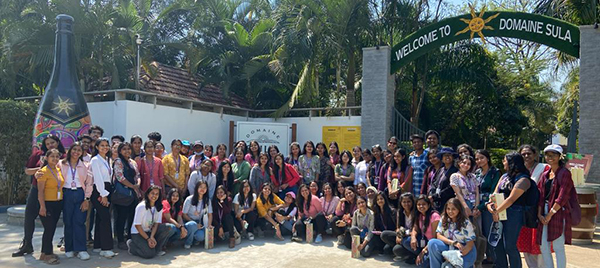
Industrial Visit to National Institute of Animal Biotechnology (NIAB), Hyderabad
Date: 19 October, 2022
As a part of earning academic credits for the completion of Post-Graduation in Life Sciences, students were taken for an institute visit to National Institute of Animal Biotechnology (NIAB), Hyderabad on 19th of October, 2022. The National Institute of Animal Biotechnology is an Indian autonomous research establishment of the Department of Biotechnology, Ministry of Science and Technology. National Institute of Animal Biotechnology (NIAB) is aimed to harness novel and emerging biotechnologies and take up research in the cutting edge areas for improving animal health and productivity. The Institute's focus of research will be on Animal Genetics and Genomics, Transgenic Technology, Reproductive Biotechnology, Infectious Diseases, Bioinformatics and Nutrition Enrichment. The institute aims at translational research leading to the development of novel vaccines, diagnostics and improved therapeutic molecules for farm animals. The Institute plans to promote bio entrepreneurship by providing support environment for commercial tenants involved in the development of farm animal based products. Students were briefed about the working and operation of instruments such as confocal microscopes, Florescent Microscopes, Flow cytometer, genotypic analysis and Animal cell culture units. Students visited Dr. Pankaj Suman’s laboratory in NIAB, where they were briefed on thedevelopment of aptamer, antibodies and nanozymes based technologies for development of diagnostics and therapeutics. These technologies are being used solely or in combination to develop affordable diagnostics for animal diseases; improvement of reproductive efficiency and for enhanced digestibility of plant biomass (cellulose) in the rumen of livestock. Students also visited the animal farm yard where they got to know about the special breed of goat called the Osmanabad variety, which is basically raised for milk and meat. This breed showed very high degree of disease resistance and capable of surviving drought conditions. A cow variety –Dangi which was procured from native breeding track, Nasik, Maharashtra. This indigenous variety of cow is robust and disease resistant. Dr. Himanshu, the veterinarian Doctor, who is the in charge of the facility explained the research taking place using these variety of cattle. Students were fortunate to be addressed by Dr. Taru Sharma, Director of NIAB, who briefed about the various opportunities and research activities taking place in NIAB and motivated the students to clear competitive exams to get into animal biotechnological research.
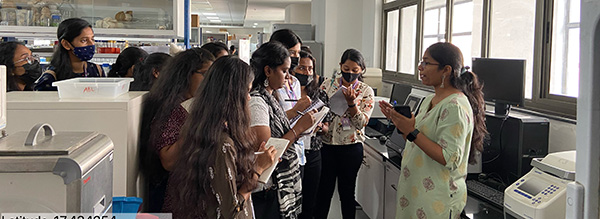
Industrial / Field Visit to Department of Crop Physiology and Central Instrumentation Facility
Date: 28.09.2022
GKVK, University of Agricutural sciences is one of the largest scientific places in the state of Karnataka. With an area covering hectares of land, it has research centres, colleges, agricultural and testing lands. Mr. Tinu George, Senior PhD research scholar, Department of Crop physiology gave an insight into the work being carried out such as molecular cloning for genetically modified crops like Mulberry. Mr. Rajesh, Technician in charge of Central Instrumentation Facility (CIF) of UAS gave us an insight on the various laboratory instruments available at the campus such as SEM and Confocal microscope where live specimens can be observed by the addition of fluorescent dyes on them. It is extremely useful as it also provides a 3D image. Mr. Rajesh also demonstrated the working of LCMS (Liquid Chromatography Mass Spectrometry). Students also learned about many medicinal plants in the botanica; garden.
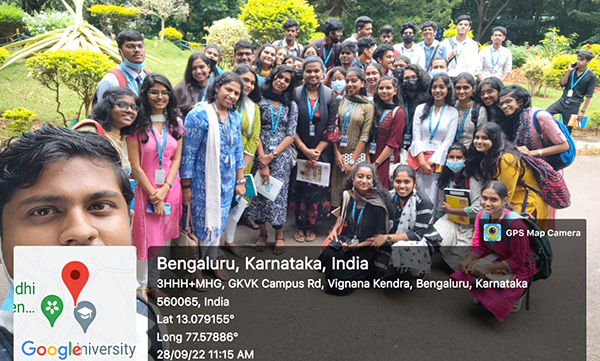
Industrial / Field Visit to Indian Institute of Horticultural Research
At IIHR, the first interaction was at Biotechnology Department, where they were briefed about plant biotechnology applications and techniques. And the students visited the Biotechnology lab and observed different equipment and specimens that were being cultured. Later they visited the Cryopreservation centre where senior scientist Dr. Rajasekharan P.E explained about Plant preservation techniques and we visited the cryopreservation room and saw seed and pollen samples that were cryopreserved. Later we had the field visit where rare and endangered plants were preserved and conserved in natural habitat. Visiting IIHR gave us a practical insight into the fields of Botany and Biotechnology. The entire experience was enriching and interesting.
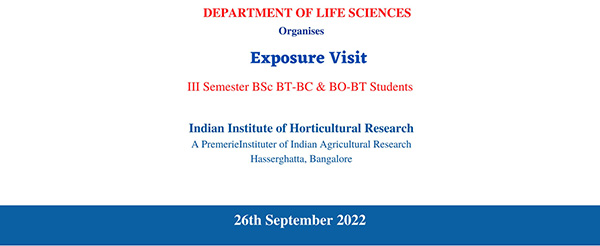
Industrial Visit - Department of Forensic Medicine & Toxicology, JSS Medical College, Mysuru
On 7th June 2022, the students of VI semester BSc. (Hons) Forensic Science visited the Department of Forensic Medicine & Toxicology, JSS Medical College, Mysuru. The purpose of the visit was to expose students to the role of Forensic Medicine in the criminal justice system. As part of the visit, autopsy demonstration and drug testing laboratory observation was planned.
The visit began with a brief presentation of the history of the college, the facilities available and the different branches functioning in the college. The students were shown around the different facilities - the moot court room, forensic museum and demonstration room attracted the attention of the students. The moot court room was used for practise of trial scenarios. The museum had organs, injuries and other forensic related exhibits. The demonstration room was used for training students.
The drug testing laboratory was part of the pharmacy college in the institution. The lab caters to clinical cases involving pharmaceuticals and drugs. The instrumentation in the laboratory included Gas Chromatography, High Performance Liquid Chromatography, Fourier Transform Infrared Spectroscopy etc. These instruments form the major techniques in forensic science as well and students could get direct exposure to them.
Finally, students were also presented autopsy demonstration with narration. The autopsy session enlightened students on the various methods of autopsy, observations and significant findings during an autopsy. Overall the students could get exposure to the different roles of a forensic medicine expert in the criminal justice system and found it very useful.
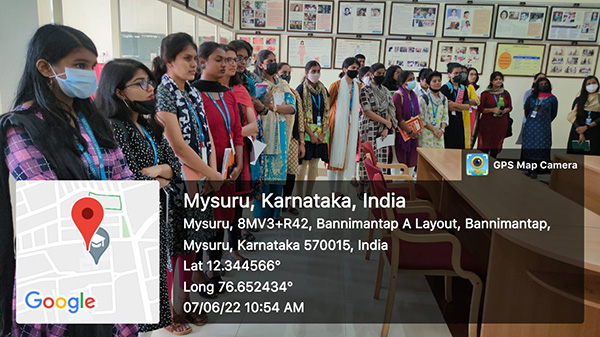
Date: 26/02/2020
Place of Visit: Axxonet System Technologies, Pvt LTD
Classes Attended & Number of beneficiaries: II Semester B.Sc. (Honours) Forensic Science. 44 Students
Objective: To introduce the students to the practical aspect of the field of forensic psychology and the procedures involved.
The students of second semester B.Sc. (Honours) Forensic Science were taken to Axxonet System Technologies, Bangalore on 26th February 2020. The students were accompanied by two faculty, Dr. Reena Josephine and Mr. Don Caeiro of the department of Life Sciences. They reached the venue at 10:15 AM. The visit started with a briefing on the company and a lecture session on Polygraph. Further the demonstration polygraph was done on two students and the students learnt how to read the graphs generated by the machine in order to determine whether the individual is deceiving or not. The students were also trained on the methods of questioning that should be used for the procedure of polygraph and they were familiarized with the instrument and its components. Then they were taken to the Brain Electrical Oscillating Signature Profiling Laboratory and were explained about the process of BEOS. A demonstration of the Electroencephalogram (EEG) was done for the students to show how the activity of the brain is measured and detected with respect to the various responses given in a forensic scenario. An explanation of the process of BEOS was given and the students were enlightened on the various cases that polygraph and BEOS were used in the country.
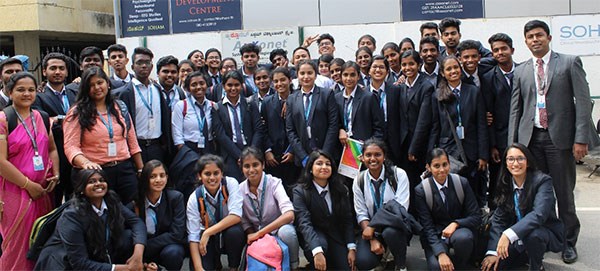
Date: 19.02.2020
Classes Attended & Number of beneficiaries: VI Sem (B.Sc (BBG & MBG) - 88 students
Places/Industry Visited: SS Vermicompost Farm & Industry, Madurai
SS vermicompost is a growing need of the agricultural sector through its quality products and prompt services. The company is dealing with Agro 100% Organic products like Vermicompost manure, Panchakavya, Organic Pesticides, Bio inputs, Soil Conditioners, Humic Acid and Micronutrient Fertilizers. They manufacture Vermicompost including organic manures in Tamil Nadu and offer the best quality of vermicompost by inculcating prime techniques. They are prominent manufacturer, supplier and exporter of these products. In addition to this, the company has also earned appreciation for providing Agricultural Consultancy and Analysis in the most professional way. The company is certified with ISO 9001:2015 and is acknowledged as the registered member of NSIC (National Small Industries Corporation). Vermicompost is a process of composting and utilizing various species of worms, to create a heterogeneous mixture. Vermi technology is a method of converting all the biodegradable waste such as cow dung, press mud (sugarcane crush), farm waste, kitchen waste, market waste, livestock waste etc. into useful products through the action of earthworms. The output is called the Vermicompost which is free of toxic chemicals and biological pollutants. Earthworms form a major component of the soil system and the organisms have been efficiently ploughing the land for millions of years and assist in the recycling of organic nutrients for efficient growth of plants. Though many species of earthworms are suitable for waste processing, two species namely Eisenas fetida and Eudrilus eugeniae have mainly taken into consideration for Vermicomposting.
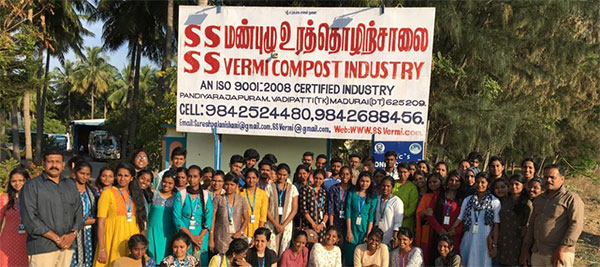
Date: 19/ 02/ 2020
Classes Attended & Number of beneficiaries: VI Sem (B.Sc (BBG & MBG) - 88 students
Places/Industry Visited: Kodai Cheese Products, Viralipatti.
Kodai Cheese began its tryst with cheese making in 1972 in a small factory in Kodaikanal, founded two generations ago by Sri Shanker. It is a fully independent, family-owned firm. We were addressed by the founder’s grandson Hari who studies cheese making in Australia. According to him, the operations have been streamlined over the past several years to remain truly Quality centric and support a dedication to furthering of the exclusive Kodai Cheese brand. The company now has a solid reputation across both its national and international clients. Each variety of cheese they create is created specifically to contribute to a balanced diet and to bring a host of health benefits. This is carried out through unique techniques that do not destroy nutrition and food value but preserve natural goodness. One can choose a number of varieties of cheese ranging from a fattier cheese like Kodai Cheddar, there are also lean varieties like Kodai Ricotta. According to them, the differences lie in salt content, cooking temperature, maturity, additives, and the type of bacteria used which gives each variety a different character. We were given different varieties of cheese to taste. They were absolutely delicious. The whole farm they have is filled with little innovations which add up to the name they stand for. Hari is an amazing person with a good sense of humour. He introduced us with many other techniques in dairy farming too. His cheese is used by various MNCs like Dominos and Big basket.
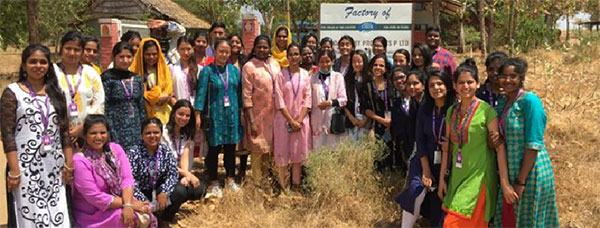
Date: 19/02/2020
Classes Attended & Number of beneficiaries: VI Sem (B.Sc. (BBG & MBG) - 88 Students
Places/Industry Visited: Sanat Spirulina Farm, Madurai
Sanat Products Ltd. is an emerging innovation-driven pharmaceutical company, based at the Capital of India New Delhi. Established in the year 1984, the company is engaged in the manufacturing and marketing of pharmaceutical, nutraceuticals, cosmeceuticals and herbal extracts. The company has Research and Development (R&D), manned by competent professionals at the corporate office as well as at manufacturing plants. The R&D wing of Sanat Products Limited is highly advanced and is duly recognized by the Department of Science and Technology (DST), Government of India. At the same time, our manufacturing units are well equipped with advanced extraction units, spray driers and active ingredients markers such as High-performance liquid chromatography (HPLC), Gas chromatography (GC) and UV spectrometers. Spirulina is a blue-green alga with high protein content and composition of vitamins, minerals, carotenoids, and antioxidants that can help protect cells from damage. It contains nutrients, including B complex vitamins, betacarotene, vitamin E, manganese, zinc, copper, iron, selenium, and gammalinolenic acid (an essential fatty acid) important for healthy living. Spirulina is low in calories and cholesterol. Spirulina is a natural food which has been used as food since ancient times. The method of its culture and production is also safe and hygienic. Spirulina has been proved to be safe food through strict toxicity tests by various research organizations. The visit enabled the BSc. students to understand the concepts of Agricultural Microbiology with a practical exposure.
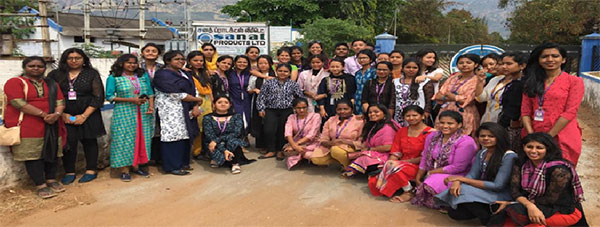
Date: 18.02.2020
Classes Attended & Number of beneficiaries: VI Sem (B.Sc (BBG & MBG) - 88 students
Places/Industry Visited: SRRC- Mannavanur
A team comprising 132 students (Under graduate final year, 88 and Post graduate final year, 44) and three faculty members from the Department of Life Sciences, Kristu Jayanti College, Bangalore-560077 made an industrial visit to Southern Regional Research Centre (SRRC), Mannavanur under the leadership of Dr. Challaraj Emmanuel, E.S., Associate Professor, on 18th February 2020. The core subjects for the undergraduate students were Biotechnology/ Microbiology, Biochemistry & Genetics. The major discipline of the post graduate students was either Biotechnology or Microbiology. At the outset, Dr. A.S. Rajendiran, Principal Scientist and Officer In-charge of SRRC Mannavanur welcomed the group and briefed about SRRC’s history, objectives, milestones, species of focus and all about the activities undertaken. Dr. G. Nagarajan, Senior Scientist (Animal Bio-technology), delivered a lecture to the students on “Utility of the Biotechnological tools in the Sheep Husbandry and Rabbit farming” & further he spoke about the common infectious diseases of Sheep and Rabbits as well as different types of vaccines being commonly used in Veterinary sciences. .Dr.S.M.K.Thirumaran, Scientist (Animal Genetics & Breeding) explained about the various breeds of Sheep & Rabbits and their utility in different geographical areas of our nation. The lectures were followed by brief students- scientists’ interaction. All the students came to know about biotechnological tools for improving livestock production, disease diagnosis, vaccines, managerial aspects of sheep husbandry & rabbit farming and expressed their gratitude to SRRC, CSWRI for giving them adequate information of their interest. The faculty members of the said college are much eager to look forward to having MoU for the mutual exchange of resources, expertise and scientific knowledge. Finally, Dr. S.M.K. Thirumaran, Scientist, explained about the various employment opportunities available for the students and thanked the students, faculty & administration of the college, for having chosen the centre for their Industrial Visit.
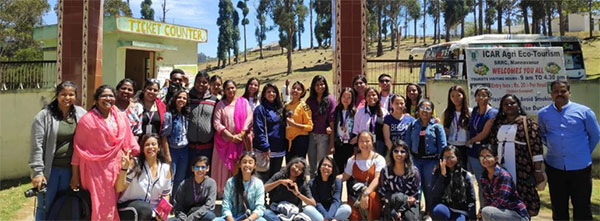
Date: 24-01-2020
Class & No. of students: II Sem B.Sc MBG & II Sem B.Sc BBB
Number of Beneficiaries: 45 (II Sem B.Sc MBG), 18 (II Sem B.Sc BBB)
Places/Industry Visited: ICAR- Indian Institute of Horticultural Research, Bengaluru
Visit to the ICAR-Research Institute was based on the Agronomy and Biotechnology application for the development of medicinal plants. The visit was initiated with cross talk with students delivered by Dr. Rajashekharan, Principal Scientist, on basics of agriculture biology and the future aspects in research and industries. The method of cryopreservation of seeds and pollen was explained and the cold room having liquid nitrogen reservoirs was also shown. After this, students visited experimental field and saw many medicinal plants such as Adathoda, Ixora, Cyanodon, Moringa etc. Students also were privileged to see some practices used in the field like bagging to avoid cross pollination and green houses. The overall visit was very informative for the students.
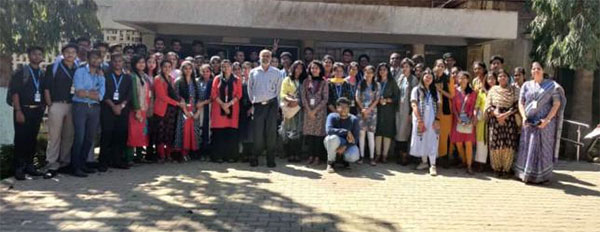
Date: 23rd January 2020
Class & No. of students: IV Sem B.Sc MBG, 47 students
Places/Industry Visited: Central Institute of Medicinal and Aromatic Plants, Allalasandra, Yelahanka, Bengaluru, Karnataka 560064
Name and details of any external agencies/contacts involved: Dr.V. Sundaresan, Scientist,
Central Institute of Medicinal and Aromatic Plants, Allalasandra, Yelahanka, Bengaluru -560064
Industrial visit is one of the tactical methods of teaching. The department of Life Sciences, Kristu Jayanti College organized an industrial visit to CSIR- CIMAP (Central Institute of Medicinal and Aromatic Plants), Yelahanka, Bengaluru for students of IV Sem B.Sc Microbiology. The students were accompanied by Dr. Shweta Sharma, Assistant Professor, Department of Life Sciences. The students along with the faculty started for CIMAP by 10:30 AM and reached CIMAP at 11.05AM. Dr. V. Sundaresan showed them the facilities in CIMAP lab assisted by Mr. Nazeer -a research scholar from the same institute. The students were led to the field where different types of aromatic and medicinal plants developed by the institute were cultivated. Almost 3 different varieties of mint and Tulsi were there. Ashwagandha, Aloe, Rosemary, Lemon Grass, Germanium were among the other plants cultivated. Field distillation units that have been commercialized have been installed and transferred to several farmers/ entrepreneurs. Students were given an opportunity to participate in the process of distillation. After the field visit, we were visited the laboratories where the research students conduct research on plant endophytes, plant tissue culture, molecular aspects, etc.
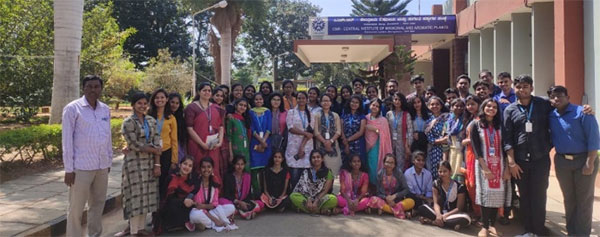
Date: 27-09-2019
Class & No. of students: I Sem B.Sc. BBG
Number of Beneficiaries: 52 Students
Places/Industry Visited: ICAR- Indian Institute of Horticultural Research, Bengaluru
An Industrial visit to “Indian Institute of Horticultural Research (IIHR)”, Hessaraghatta Lake Post, Bengaluru, Karnataka-560 089 was organized by Department of Life Sciences, Kristu Jayanti College, Bengaluru on Friday, 27th September 2019. Fifty students of first semester B.Sc Biotechnology and one faculty member visited to IIHR, to interact with the Scientists to understand current developments, most-demanding technologies and criteria for improving crops, selection etc.
The main research agenda of the institute is to increase the yields of horticultural crop varieties by developing high yielding varieties in fruits, vegetables, ornamentals and medicinal and aromatic plants and also to develop advanced production technologies to increase the productivity of horticultural crops. The IIHR, Bangalore has been carrying out active research in fruits, vegetables, ornamentals, medicinal and aromatic plants and mushrooms.
Dr. Venkatta Kumar, Principal Scientist and The Head, Extension and Training Centre, gave a brief introduction about the development and goal of Indian Institute of Horticultural Research (IIHR) to the students. The Technical Head of IIHR conducted very informative teaching session for the students. He highlighted the emergence of new challenges in the fields of productivities, crop production, crop protection and crop utilization. His emphasize laid on developing integrated pest and disease management technologies to increase crop yields, protect crops from insect- pests, disease and viruses free and extension of shelf life of crop production, developing integrated water and nutrient management protocols towards optimum utilization of resources developing Post Harvest Management practices to reduce the post-harvest losses, breeding varieties for biotic and abiotic stresses, breeding F1 hybrids, and further value added products and research areas. The students raised different questions to the Technical Head on current technologies for improving crops, hybrid varieties, post harvesting scenarios etc. and he cleared all the doubt and myths which was in students mind about the technologies practiced in the institute.
The students were then directed to research labs of Biotechnology Division which include Plant Tissue Culture (PTC) and Plant Molecular Biology laboratories. The Research assistants explained their research area and the on-going research in the institute and expounded the principles of various instruments to the students. Also they motivated the students to select their domain and area of interest for pursuing research in the coming future. The session was concluded with Question-Answer session. All students were satisfied after the session. The visit came to an end at 4.30 p.m. It was an informative, interesting and a successful visit. As students of Biotechnology, they understand importance of technology selection and its applications etc. We express our thanks to the Technical Head and all team members of IIHR, Bengaluru, who spent their valuable time with us. We sincerely thank our respected Father-Principal, The Dean and HOD, who motivated us to arrange such an informative program.
